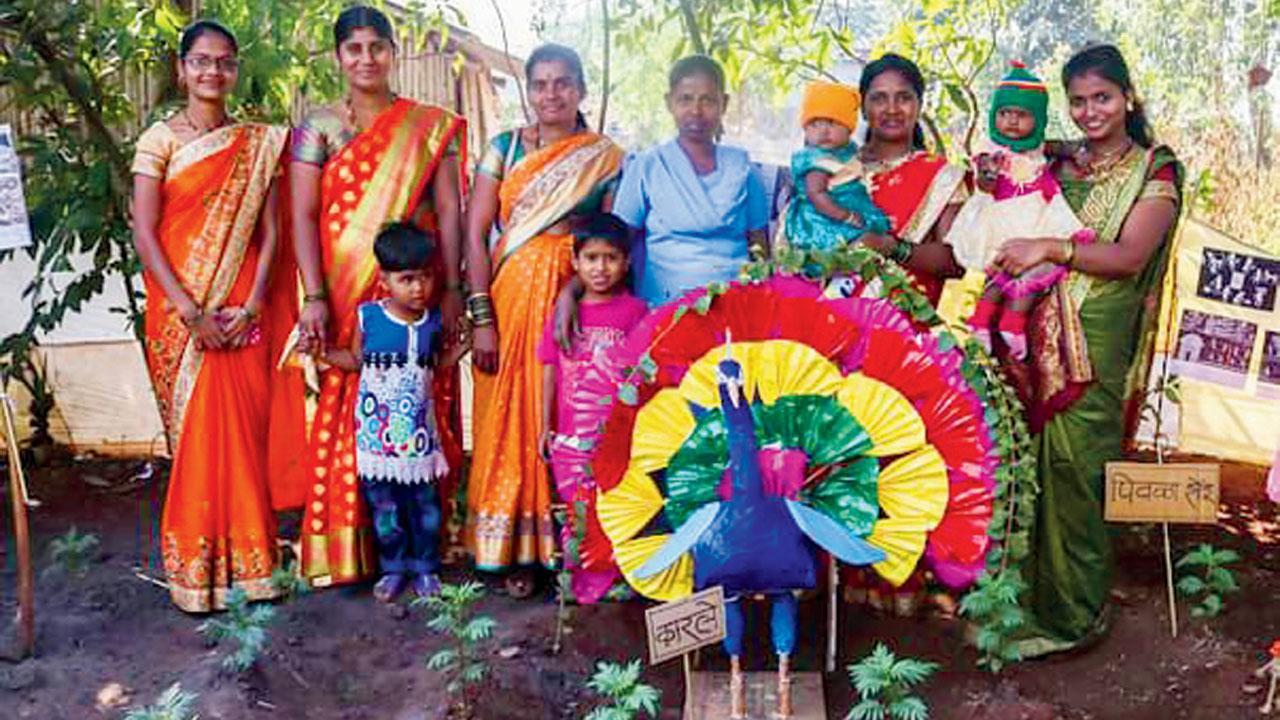Subodh Jain's after-school intervention in Kolhapur's villages proves to be a game changer during classroom-disruptive pandemic

Local women play mentors (L to R) Arshika Ghavale, Manisha Magdum, Supriya Kagwade, Alka Sonawane, Archana Hande, Kajal Khot
Subodh Jain, 28
Co-founder, Insight Walk Education
Rahul, a Class 8 student at Vidya Mandir, Dhakale, was proving to be a challenge for his teacher. Poor grades in science, math, history and geography were reported to his family, leading his alcoholic father to cane him. But things took a turn once he was out of school. At the Solidarity Art Farm Museum, an open-air community centre run by Insight Walk Education (IWE), he shows off his skill at embroidery, and is often documenting the world of insects and animals. The boy who aspires to be a wildlife researcher spent the lockdown studying the effects of chemicals on crops. IWE's co-founder and worker-in-chief, Subodh Jain says this has to do with learning in an open, non-judgmental space. IWE fellow Alka Sonawane spoke to Rahul's teacher to help inspire lateral learning.
Class VIII student, Rahul loves to embroider and research the effect of chemicals on crops
During the pandemic induced-lockdown, the Solidarity Art Farm Museum proved to be a promise of hope for the hamlet in Hatkanangale district of Kolhapur. Jain, who founded IWE with his journalist brother Sanket in 2017, says, "The village is fighting for status, and doesn't have a local panchayat or representation. Casteism holds power, making it tough to find space for a community centre that welcomes kids from all strata."
Finally, they settled on a small patch of field, and started the centre with 10 children in 2018. Today, it sees a turnout of 100, while the centre itself has transformed into a museum of sorts allowing six to 14-year-olds a free space to experiment with art and science, vegetable dyeing, pottery, block-printing, upcycling trash and growing organic crops.
The Solidarity Art Farm Museum in Dhakale has grandparents schooling the kids on farming
When the lockdown shifted schooling from classroom to e-learning in the cities, the children of Dhakale faced a conundrum. "Villages face daily power cuts. And the families wondered, should we spend on a smartphone, monthly recharge, or buy ration?" Jain adds. What they didn't have to worry about was vegetables. Lessons from the 2019 floods in Kolhapur had taught the kids of the dangers of depending on external agencies for food supplies, and so by the time the pandemic hit, they were already growing vegetables. Kolhapur, Maharashtra's sugar-belt, is home to sugarcane cultivation, but over time, the water-intensive crop has led to soil depletion. The children, who had researched growing multi-crops, organically, were able to provide for their families during the lockdown, Jain explains. The children also learned how to make cloth masks and face shields from upcycled scraps and plastic bottles for healthcare workers, and pulley-run hand sanitisers. They even made motorised vegetable cutters, hand blenders, floor cleaners, portable washing machines and dryers, out of trash. "COVID-19, ironically, offered us hope. It was an exam in life skills for the children," Jain thinks, "They turned into innovators, farmers, problem-solvers. Why wait for a crisis when you can make local learning part of your everyday living?"
Jain, who, holds a B Tech degree in Computer Science is fixated on revamping education at the grassroots, and works in the villages of Mangaonwadi, Golivane and Sonarli besides Dhakale. He does this by involving the locals themselves. Ten women, all school or college dropouts, have day jobs as wage workers or agricultural labourers. But at the respective centres, they function as "fellows" to mentor the kids for a monthly salary. "Most of them belong to Dalit families, who instead of being discouraged by prejudice are committed to changing the circumstance of the children," Jain says.
Engineer and education reformer Subodh Jain wonders why farming isn't part of the school curriculum
Because it takes a village to build a community, Jain dips into the experience and knowledge of locals to empower the kids with novel skills. The village potter becomes a mentor for children interested in sculpting. It wasn't long before the elders too showed up at the community centres that are open 365 days, some learning from the kids, others teaching them. "Elders bring with them wisdom. Their journey includes lessons that the instant-gratification generation can learn from."
Help the kids get edu kits
The IWE model works on individual donations. The non-profit is crowd-funding to provide education kits—art, science, literature, embroidery, block printing, farming—for kids who are stuck at home. It's estimated that most students in the higher standards will drop out from schools post-lockdown. "Since April, we have seen an increase in young girls getting married to prevent them from returning to the classroom. Until schools reopen, these education kits will keep the students connected to learning," says Jain. Distributed monthly, each kit costs R450 to put together, and includes a small stipend for the fellow. To contribute, log on to https://milaap.org/fundraisers/support-insight-walk-education-1
 Subscribe today by clicking the link and stay updated with the latest news!" Click here!
Subscribe today by clicking the link and stay updated with the latest news!" Click here!









